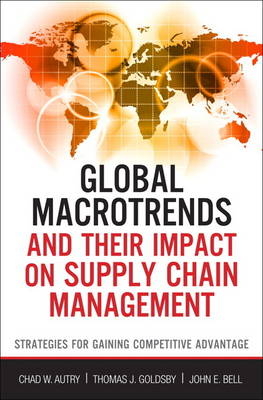
Global Macrotrends and Their Impact on Supply Chain Management
Financial Times Prentice Hall (Verlag)
978-0-13-294418-2 (ISBN)
- Titel ist leider vergriffen;
keine Neuauflage - Artikel merken
CHAD W. AUTRY is Associate Professor of Supply Chain Management and Director of Supply Chain Forum—North America at the University of Tennessee’s College of Business Administration. He contributes actively to the Council of Supply Chain Management Professionals and the Warehouse Education and Research Council, and has led local and national events for the Production and Operations Management Society and Institute for Supply Management. He holds a Ph.D. in Business Administration/Supply Chain Management from the University of Oklahoma. THOMAS J. GOLDSBY, Professor of Logistics at The Ohio State University, is Associate Director of its Center for Operational Excellence and Research Associate at its Global Supply Chain Forum. He has supervised more than 100 Lean/Six Sigma supply chain projects with industry partners and coauthored the book Lean Six Sigma Logistics. He has received recognition for excellence in teaching and research at Iowa State University, The Ohio State University, and the University of Kentucky. He holds a Ph.D. in Marketing and Logistics from Michigan State University. JOHN E. BELL is an Assistant Professor of Supply Chain Management at the University of Tennessee’s College of Business Administration and a board member of the Western Decision Sciences Institute. He earned his Ph.D. in Management at Auburn University, taught at the Air Force Institute of Technology and Georgia College & State University, and spent more than 20 years as a U.S. Air Force logistics and maintenance officer. He has published more than 20 academic articles on vehicle routing, facility location selection, supply chain strategy, and related topics.
Preface xiv
Part I Global Macrotrends Impacting the Supply Chain Environment 1
Chapter 1 Supply Chain Management in the 21st Century 3
A Note on Futurism 7
The Underpinnings of Supply Chain Management 9
What You Will Learn from This Book 15
Managing the Supply Chain to Mitigate Macrotrend Risks 18
Chapter 2 Global Population Growth and Migration 21
Impacts of Population Change on Demand and Supply 25
Population Growth Perspectives 27
Organic Population Growth Issues for Supply Chain Managers 33
Supply Chain Problems Created by Migration-Based Growth 36
The Future Supply Chain Manager’s Population-Oriented Agenda 41
Chapter 3 Global Connectivity and Socioeconomic Leveling 55
Is Globalization Real? 57
Economic Leveling and Connectivity Issues for Future Supply Chain Managers 68
Chapter 4 The Changing Physical Environment 83
The Environment and You, You and the Environment 86
Environmental Pressures on Supply Chains 93
Environmental Challenges for Future Supply Chain Managers 99
Chapter 5 Geopolitical and Social Systems Disruptions 111
Commodity Hoarding and Export Restriction: The China Syndrome 117
Government Risks and Considerations 125
Tangible and Virtual Intentional Disruption 129
Geopolitical Challenges for Future Supply
Chain Managers 132
Part II Macrotrend Implications for Supply Chain Functionality 147
Chapter 6 Implications for Supply Chain Planning:
Demand and Supply Uncertainty 149
How Supply Chain Plans Improve Performance 151
The Supply Chain Planning Function 153
Macrotrend Demand/Supply Impacts: Supply Chain Planning Considerations 157
Chapter 7 Implications for Sourcing/Procurement: Natural Resource Scarcity 165
Understanding Resource Scarcity Today and Tomorrow 166
Natural Resource Attributes and Their Future Implications 170
The Seven Forces Driving Resource Scarcity 174
Scarcity Strategies for the Future Procurement/Supply Manager 180
Sourcing and Procurement Responses to Resource Scarcity Through 2030 182
Chapter 8 Implications for Production: Disrupted Process Flows 185
Manufacturing and the Larger Economy 186
Manufacturing-Driven Supply Chain Strategies 191
Manufacturing Strategies for the Future Production Manager 201
Chapter 9 Implications for Transportation/Logistics: Congestion and Infrastructure Decay 207
Friction of Distance 209
Public-Private Partnerships and Other Solutions 213
Responding to Congestion, Distance Friction, and an Overwhelmed Infrastructure 215
Diffusing Congestion with Advanced Technologies 221
Part III Macrotrend Risk-Mitigation Strategies 225
Chapter 10 Mitigating Supply-Driven Imbalance 227
Employment Approaches 230
Conservation Approaches 235
Resource Scarcity Mitigation Strategies for the Supply Chain 240
Mitigating Supply-Driven Imbalances 244
Chapter 11 Mitigating Demand-Driven Imbalance 247
Demand Shaping in the Transforming World: Macro and Micro Issues 250
The Case for Demand/Supply Integration 254
Implementing DSI to Mitigate Demand-Side Imbalances 258
Applying the Demand-Imbalance Mitigation Strategies 272
Index 275
| Erscheint lt. Verlag | 11.1.2013 |
|---|---|
| Verlagsort | Upper Saddle River |
| Sprache | englisch |
| Maße | 162 x 234 mm |
| Gewicht | 560 g |
| Themenwelt | Wirtschaft ► Betriebswirtschaft / Management ► Logistik / Produktion |
| Wirtschaft ► Betriebswirtschaft / Management ► Unternehmensführung / Management | |
| ISBN-10 | 0-13-294418-9 / 0132944189 |
| ISBN-13 | 978-0-13-294418-2 / 9780132944182 |
| Zustand | Neuware |
| Haben Sie eine Frage zum Produkt? |
aus dem Bereich


